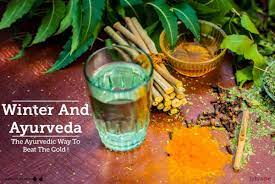Besides diet and lifestyle which are big factors, there are three aspects that determine your immunity quotient:
- Hereditary (Sahaj) — the innate level of immunity, which you are born with.
- Seasonal (Kalaj) — fluctuating levels of immunity due to the change of seasons, different stages of life, and the planetary cycles.
- Established (Yuktikrit) — a balanced, permanent level of immunity that can be realized by following an ayurvedic diet and lifestyle.
If someone is born with an innately low level of immunity, that just cannot be changed. That’s why in Ayurveda, it’s crucial to focus on strengthening the second type of immunity, which can fluctuate with the seasons, one’s age, and even the planetary cycles.
Why winter is good news for your immunity:
One reason that winter is a good season for building immunity is that digestion is stronger in cold weather. Just as your home’s heating system works harder in cold weather, so too does your inner digestive fire when the air turns chilly. This is a good thing!
Due to the digestive level being very high, people feel more hungry, and you can actually digest food better in winter, thus nourishing your body with greater efficiency.
The problem is that sometimes, as the appetite increases, people may eat more junk food, holiday sweets and heavy, hard-to-digest foods, and thus they weaken their immunity.
This debunks the theory that nature is to blame, since by following a good Ayurvedic daily routine, eating more superfoods that boost the immune system, plus by getting more rest, you can nourish the mind and body during winter.
The best foods to eat in the winter season:
In general, Ayurveda recommends food that is fresh, organic, easy to digest, pure, and wholesome. These include fresh, organic milk and yogurt, vegetables, fruits, whole grains, and of course the revered ghee (clarified butter).
Foods that are hard to digest should be avoided if you want to increase your immunity.
This means toss the packaged and canned goods from your shopping basket.
The tastes to focus on in the winter are sweet, sour and salty. It’s best to eat less of the astringent, bitter, and pungent tastes in winter, although all six tastes should be included in your diet.
Of course, warm, home-cooked, hearty foods are ideal, as long as they are not deep-fried and are cooked with easy-to-digest oils such as ghee or olive oil. Avoid cold or ice-cold foods or drinks, because those will put out the digestive fire.
Herbs you’ll want to stock up on for the winter:
Ashwagandha:
Ashwagandha is a popular Ayurvedic herb known for its adaptogenic properties, which helps the body adapt to stress and promote a balanced immune response. It supports immune function by reducing inflammation and enhancing the activity of immune cells. Consuming ashwagandha as a supplement or incorporating it into your diet can help strengthen your immune system naturally.
Tulsi (Holy Basil):
Tulsi, also known as Holy Basil, is considered one of the most sacred herbs in Ayurveda. It is known for its potent antioxidant and immune-modulating properties. Tulsi helps boost immunity by combating oxidative stress, reducing inflammation, and supporting respiratory health. Consuming tulsi tea or taking tulsi supplements can help enhance your immune defense.
Amalaki (Indian Gooseberry):
Amalaki, or Indian Gooseberry, is a rich source of vitamin C, which is crucial for maintaining a healthy immune system. It also possesses antioxidant properties and supports detoxification within the body. Consuming amalaki supplements or incorporating fresh amalaki juice or powder into your diet can help bolster your immune system.
Ginger:
Ginger is a potent herb widely used in Ayurvedic medicine for its immune-boosting properties. It has antiviral and antibacterial properties that help fight infections and strengthen the immune system. Consuming ginger tea, adding ginger to meals, or taking ginger supplements can support immune function.
Turmeric:
Turmeric is well-known for its anti-inflammatory and antioxidant properties. It contains a compound called curcumin, which can modulate the immune system and enhance immune response. Adding turmeric to meals or taking curcumin supplements can aid in strengthening the immune system.
Adding natural Ayurvedic herbs and supplements into your daily routine is a proactive approach to boost immunity. Just remember that your individual needs can vary, so it’s best to consult with an Ayurvedic practitioner or healthcare professional for personalized advice.
Finally, remember to rest and treat yourself well
Your lifestyle has a profound impact on your immunity. Staying up late, working at night, eating at weird or irregular times, and exposing the body to stress or fatigue can all affect digestion and body rhythms which in turn compromises the immune system.
It also gets darker in the winter earlier, so you will want to get into bed earlier anyway. Follow this natural flow and time so you can wake up fresh and rested, just as nature intended.

